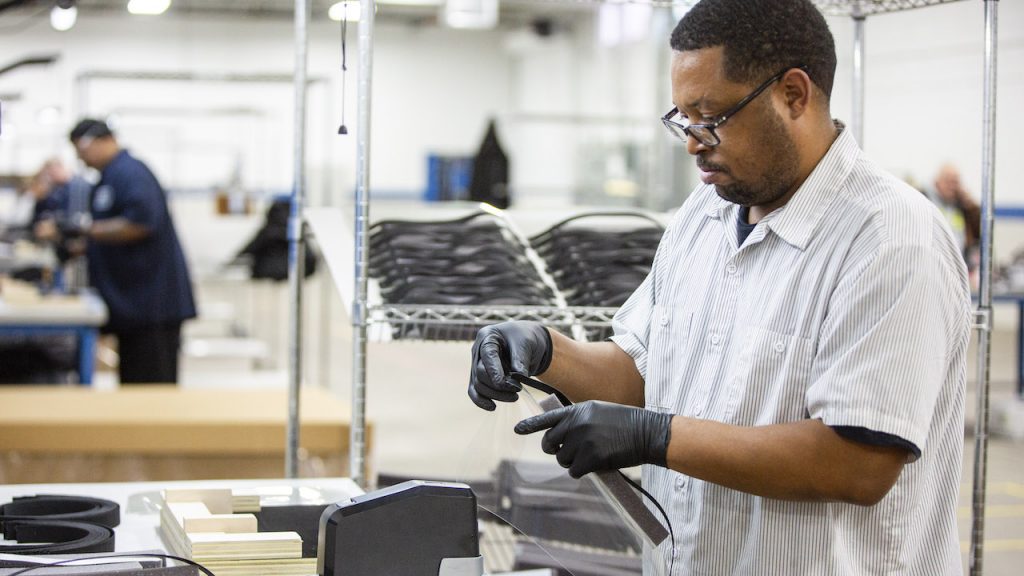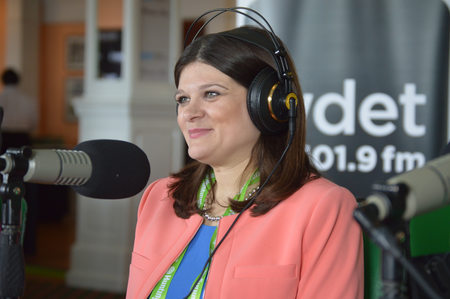Automakers Help to Fill Medical Equipment Shortage, But It’s Not Easy
Congresswoman Haley Stevens joins MichMash to talk about retooling efforts, as well as how the federal government is trying to help small businesses.

One of the biggest challenges the United States faces in the coronavirus pandemic is a shortage of life-saving medical supplies and equipment like ventilators for critically ill COVID-19 patients.
Americans may need as many as 740,000 ventilators during this crisis. But there are only about 160,000 available right now, according to Johns Hopkins University.
“The physical production of something is, whether it’s a face-mask or an automobile or a ventilator, is very complicated and it takes a lot of dedicated precision and commitment to good engineering practices.” – Rep. Haley Stevens (D-MI)
Enter auto makers and other businesses, big and small.
Listen to the latest episode of MichMash above, and subscribe over iTunes, NPR One, Spotify or where ever you get your podcasts.

Shuttered because of concerns about their employees becoming ill or because they were not considered essential services in states like Michigan where there is a “stay home” order, auto manufacturers are now starting to retool their plants to make things like ventilators, masks and specialized hospital beds.
When the idea was first floated a lot of people were skeptical that auto makers wouldn’t have the precision instruments, digital software, or expertise to pull it off quickly.
But it turns out, there are a lot of things auto makers can do to ramp up production. Congresswoman Haley Stevens, a Democrat representing Michigan’s 11th district, said, in the end, a lot of it comes down to having great engineers.
“The physical production of something is, whether it’s a face-mask or an automobile or a ventilator, is very complicated and it takes a lot of dedicated precision and commitment to good engineering practices,” she said.
Easier Ways to Help
The auto industry has a lot of expertise on making things more efficiently, and they think that can find ways to help medical manufacturers in that area. Auto manufacturers like Ford are already working on ways to serve as consultants of sorts for medical supply and equipment manufacturers. And companies such as GM are looking for ways to design even more simple ventilators that can be made faster.
Ford also just announced that it has made one million face shields in 13 days.
Another important thing to keep in mind is that when we talk about something like ventilators, we’re not talking about equipment that is all the same.
There are high-end ventilators for the sickest patients that are much more complex and expensive to build. Then, there are simpler ventilators for less sick patients that don’t require such complicated engineering and parts. That might be one area where automakers can really help ramping up production, especially because some ventilator manufacturers are talking about making some of their designs open source.
Big Challenges Ahead
No matter who is making these things needs a good supply chain to get all the parts to their factories. A lot of work is being done now to make sure there aren’t any bottlenecks in those supply chains.
It’s also not always easy to get private corporations to work together seamlessly. Some medical manufacturing companies have been hesitant about working with auto manufacturers. Part of those concerns also have to do with safety. It’s important not just that these machines are made quickly, but that they are also safe.
So getting all those things to come together is still a work in progress.
Helping Small Businesses
Last week, MichMash delved into the help available locally for small businesses in Michigan. But, as Rep. Stevens notes, there is also help becoming available at the federal level for small businesses, especially in the form of the new Paycheck Protection Program.
The program provides a total of almost $350 billion in forgivable loans. It will offer loans of up to $10 million at one percent interest to businesses and nonprofits with 500 workers or fewer to cover payroll and overhead expenses. The problem is that the rollout of this program has been confusing for banks and businesses.
Trusted, accurate, up-to-date
WDET is here to keep you informed on essential information, news and resources related to COVID-19.
This is a stressful, insecure time for many. So it’s more important than ever for you, our listeners and readers, who are able to donate to keep supporting WDET’s mission. Please make a gift today.
